Porsche Cayenne
| Porsche Cayenne | |
|---|---|
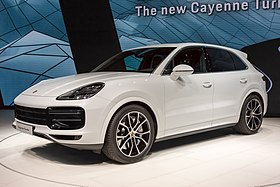 Porsche Cayenne (third generation) | |
| Overview | |
| Manufacturer | Porsche AG |
| Production | 2002–present |
| Model years | 2003–present |
| Assembly |
|
| Body and chassis | |
| Class | Mid-size luxury SUV |
| Layout | Front-engine, four-wheel-drive |
The Porsche Cayenne is a series of mid-size luxury crossover sport utility vehicles manufactured by the German automaker Porsche since 2002, with North American sales beginning in 2003. It is the first V8-engined vehicle built by Porsche since 1995, when the Porsche 928 was discontinued. It is also Porsche's first off-road variant vehicle since its Super and Junior tractors of the 1950s, and the first Porsche with four doors. Since 2008, all engines have featured direct injection technology.
The second-generation Cayenne (Type 92A) was unveiled at the 2010 Geneva Motor Show in March following an online reveal. The Cayenne shares its platform, body frame, doors and electronics with the similar Volkswagen Touareg and Audi Q7. The second generation received a facelift in 2014 with minor external changes, and introduced a new plug-in E-Hybrid version, with its public launch at the Paris Motor Show.[2]
First generation (2003)[]
| First generation (9PA) Chassis E1 | |
|---|---|
 | |
| Overview | |
| Production | 2002–2010 |
| Model years | 2003–2010 |
| Body and chassis | |
| Body style | 5-door SUV |
| Platform | Volkswagen Group PL71 platform |
| Related | Volkswagen Touareg Audi Q7 Ruf Dakara |
| Powertrain | |
| Engine | |
| Transmission | 6-speed Aisin Warner automatic with Tiptronic manual shift mode 6-speed ZF manual |
| Dimensions | |
| Wheelbase | 2,855 mm (112.4 in) |
| Length | 4,780 mm (188.2 in) Turbo: 4,783 mm (188.3 in) |
| Width | 1,928 mm (75.9 in) |
| Height | 1,700 mm (66.9 in) |
The Porsche Cayenne 955 entered the market to a mixed reception, although it was the performance vehicle among SUVs and had comparably good handling as well as powerful engines.[3] The lineup initially consisted of the V8-powered Cayenne S and Cayenne Turbo. Later in the model cycle, VR6 and diesel-powered versions joined the lineup.
The base model is powered by a VW 3.2-L VR6 engine producing 250 PS (184 kW; 247 hp). The intake manifold is unique to Porsche, but otherwise the engine is largely the same as the VW engine. Acceleration from 0–100 km/h (62 mph) is 9.3 seconds with the manual transmission and 9.7 seconds with the Tiptronic S.

Cayenne S[]

The S is powered by a 4.5L V8 engine with a dry-sump lubrication system and variable valve timing. It produces 340 hp (254 kW; 345 PS) and 310 lb⋅ft (420 N⋅m) of torque. Acceleration from 0–60 mph (97 km/h) takes 6.9 seconds and the top speed is 150 mph (241 km/h).[4]
Introduced only for 2006 (as a pre-GTS concept), the Cayenne S Titanium Edition was a 1 year exclusive, limited production SUV featuring a lightweight steel body, featuring an aluminium hood (lighter than the one equipped on the Cayenne S), titanium-painted accented body parts, side lower rocker body panels, Sport-Quad Tip Exhaust chrome tailpipes, 19" titanium painted alloy wheels, bi-xenon headlights, two-tone interior upholstery, Porsche PCM 2.0 w/ trip computer navigation, MP3 audio and Bose cabin surround sound. Under the hood, improvements included sport-tuned suspension, an aerodynamic body package, low-range transfer case, locking differential and a 6-speed automatic Tiptronic transmission. The Cayenne S Titanium Edition is powered by the same 4.5L V8 engine that powered the Cayenne S - still producing 340 hp (254 kW; 345 PS) and 310 lb·ft (420 N·m) of torque. Acceleration is even quicker than the regular Cayenne S from 0–60 mph (97 km/h) at sub[specify] 6.2 seconds[clarification needed] and the top speed is 150+ mph.[clarification needed]
Cayenne GTS[]
The GTS 957 is powered with a 405 PS (298 kW; 399 hp) 4.8 L V8 and features a sport suspension and 21-inch (533 mm) wheels. It is lighter than the Cayenne S and has an aerodynamic body kit. The Porsche Cayenne GTS has a 0–100 km/h (62 mph) time of 5.7 seconds. A six-speed manual transmission is also offered.[5]
Cayenne Turbo and Turbo S[]

The first-generation Cayenne Turbo 955 has 450 PS (331 kW), and can accelerate from 0–100 km/h (62 mph) in 5.3 seconds.[4] A Turbo S version was built in 2006 to compete with the Mercedes-Benz ML 63 AMG. The Cayenne Turbo and Turbo S include a low-range case, a locking differential, and height-adjustable, off-road suspension. The Turbo S is powered by a twin-turbocharged 4.5 L V8 that produces 521 PS (383 kW; 514 hp) and 720 N⋅m (530 lb⋅ft) of torque; Acceleration from 0–60 mph (97 km/h) takes 5.0 seconds and the top speed is 171 mph (275 km/h); It features a six-speed automatic Tiptronic transmission.
In 2008 an updated Turbo model 957, featuring a larger 4.8-L engine, was revealed at the Beijing Auto Show. It produces 50 PS (37 kW; 49 hp) more power, and can accelerate from 0–60 mph (97 km/h) in 4.9 seconds.[6] Also revealed with the new Turbo, was a new 550 hp (410 kW) Turbo S model. Acceleration from 0–60 mph (97 km/h) for that car takes 4.7 seconds and it can be had with optional ceramic composite brakes.
Cayenne Diesel[]
Porsche has sold a diesel version of the Cayenne, powered by a 3.0-L V6 VW TDI engine, since February 2009.[7] The engine is rated at 240 PS (177 kW; 237 hp) and 550 N⋅m (410 lb⋅ft) of torque. The car was unveiled at the 2009 Geneva Motor Show.[8] The diesel can accelerate from 0–60 mph (97 km/h) in 9.2 seconds.
Cayenne S Transsyberia[]
The Cayenne S Transsyberia was originally a racing vehicle designed for Transsyberia rally, only 26 were built.[9]
The street version was later built to commemorate Porsche's victory in the Transsyberia rally. It is a variant with the 405 hp (302 kW) direct-inject 4.8-L V8 from the Cayenne GTS. Sales began in January 2009, with a production run of 600 road vehicles.[10]
Cayenne GTS Porsche Design Edition 3 (2010)[]
In May 2009,[11] a limited edition version based on the Cayenne GTS was introduced, designed by Porsche Design Studio and included a Porsche Design chronograph Type P’6612. Production was limited to 1000 units, 100 in the USA.[12]
Engines[]
This section does not cite any sources. (December 2016) |
| Model | Production period | Engine | Power (PS, torque) at rpm |
|---|---|---|---|
| Cayenne | 2003-2006 | 3,189 cc (3.2 L; 194.6 cu in) VR6 | 250 PS (184 kW; 247 hp) at 6,000, 310 N⋅m (229 lb⋅ft) at 2,500 |
| Cayenne | 2008-2010 | 3,598 cc (3.6 L; 219.6 cu in) VR6 | 290 PS (213 kW; 286 hp) at 6,200, 385 N⋅m (284 lb⋅ft) at 3,000 |
| Cayenne S | 2002-2006 | 4,511 cc (4.5 L; 275.3 cu in) V8 | 340 PS (250 kW; 335 hp) at 6,000, 420 N⋅m (310 lb⋅ft) at 2,500 |
| Cayenne S Titanium Edition | 2006 only | 4,511 cc (4.5 L; 275.3 cu in) V8 | 344.7 PS (254 kW; 340 hp) at 6,000, 420 N⋅m (310 lb⋅ft) at 2,500 |
| Cayenne S | 2008-2010 | 4,806 cc (4.8 L; 293.3 cu in) V8 | 385 PS (283 kW; 380 hp) at 6,200, 500 N⋅m (369 lb⋅ft) at 3,500 |
| Cayenne S Transsyberia | 2006 | 4,806 cc (4.8 L; 293.3 cu in) V8 | 405 PS (298 kW; 399 hp) at 6,500, 500 N⋅m (369 lb⋅ft) at 3,500 |
| Cayenne GTS | 2008-2010 | 4,806 cc (4.8 L; 293.3 cu in) V8 | 405 PS (298 kW; 399 hp) at 6,500, 500 N⋅m (369 lb⋅ft) at 3,500 |
| Cayenne GTS Porsche Design Edition 3 | 2009-2009 | 4,806 cc (4.8 L; 293.3 cu in) V8 | 405 PS (298 kW; 399 hp) at 6,500, 500 N⋅m (369 lb⋅ft) at 3,500 |
| Cayenne Turbo | 2002-2006 | 4,511 cc (4.5 L; 275.3 cu in) twin turbo V8 | 450 PS (331 kW; 444 hp) at 6,000, 620 N⋅m (457 lb⋅ft) at 2,250 |
| Cayenne Turbo | 2008-2010 | 4,806 cc (4.8 L; 293.3 cu in) twin turbo V8 | 500 PS (368 kW; 493 hp) at 6,000, 700 N⋅m (516 lb⋅ft) at 4,500 |
| Cayenne Turbo S | 2006 | 4,511 cc (4.5 L; 275.3 cu in) twin turbo V8 | 520 PS (382 kW; 513 hp) at 5,500, 720 N⋅m (531 lb⋅ft) at 2,750 |
| Cayenne Turbo S | 2008-2010 | 4,806 cc (4.8 L; 293.3 cu in) twin turbo V8 | 550 PS (405 kW; 542 hp) at 6,000, 750 N⋅m (553 lb⋅ft) at 2,250 |
| Cayenne Diesel | 2009-2010 | 2,967 cc (3.0 L; 181.1 cu in) turbo V6 | 240 PS (176 KW; 237 hp) at 4,000, 550 N⋅m (406 lb⋅ft) at 2,000 |
Second generation (2011)[]
| Second generation (92A) Chassis E2 | |
|---|---|
 | |
| Overview | |
| Production | 2010–2017 |
| Model years | 2011–2018 |
| Body and chassis | |
| Body style | 5-door SUV |
| Platform | Volkswagen Group PL72 platform |
| Related | Volkswagen Touareg |
| Powertrain | |
| Engine | Gasoline: 3.0 S/C V6 333PS 3.6 VR6 300PS 4.8 V8 400PS / 420PS 4.8 TT V8 500PS / 550PS Diesel: 3.0 V6 250PS 4.1 V8 385 PS Hybrid 3.0 hybrid S/C V6 380PS (Cayenne S hybrid) 3.0 PHEV S/C V6 (E-Hybrid) |
| Electric motor | 35 kW (47 hp; 48 PS) 1NM AC synchronous (Cayenne S hybrid) 61 kW (82 hp; 83 PS) 1NM AC synchronous (Cayenne S E-Hybrid) |
| Transmission | 6-Speed ZF manual [13] 8-Speed Aisin TR-80SD Tiptronic S automatic[14] |
| Hybrid drivetrain | Power-split (Cayenne S hybrid) PHEV (Cayenne S E-Hybrid) |
| Battery | Nickel-metal hydride (Cayenne S hybrid) lithium-ion battery (Cayenne S E-Hybrid) |
| Dimensions | |
| Wheelbase | 2,895 mm (114.0 in) |
| Length | 4,846 mm (190.8 in) (2010-14) 4,855 mm (191.1 in)(2014-) |
| Width | 1,938 mm (76.3 in) (2010-14) 1,939 mm (76.3 in)(2014-) |
| Height | 1,705 mm (67.1 in) |
| Curb weight | 2,085–2,215 kg (4,597–4,883 lb) |
The second-generation Porsche Cayenne 958 went on sale in April–May 2010 as a 2011 model, with an official debut at the 2010 Geneva Motor Show. In preparation for the unveiling, the Cayenne production facility in Leipzig, Germany, closed in December 2009 to commence factory retooling for the new model, a process that took 2–3 months.[citation needed]



The 2011 Porsche Cayenne is larger than its predecessors, but features a more slanted rear window, less upright windshield, a more sloping roofline, door-mounted mirrors, smaller windows at the rear of the vehicle, headlights inspired by the Carrera GT, taillights that extend onto the car's tailgate, LED daytime running lights and a vastly redesigned interior much like the Panamera.[15] The 2011 Cayenne is almost 250 kg (551 lb) lighter than the previous models due to removing the low-range transfer case making it slightly more fuel efficient than the previous lineup. More use of aluminium and magnesium too helped shave weight[16] Despite its lower stance, the new vehicle's off-road capabilities have been retained without compromising the street performance-oriented layout and design.[citation needed] In addition to a diesel offering, a hybrid version is available.[17] Also, model year 2013 - 2016 diesel Porsche Cayennes are included in the Volkswagen emissions scandal.
Standard features of the 2011 Porsche Cayenne include air conditioning with dual-zone climate controls, interior air filter, tilt/telescopic leather-wrapped steering wheel with radio controls, cruise control, leather upholstery, eight-way power front seats, outside-temperature indicator, and universal garage door opener in the base model. The Cayenne S adds a power sunroof and memory for the driver's seat.[16] The Cayenne GTS added an optional rearview camera, keyless access and start, and memory system. Finally, the most upscale Cayenne Turbo and Turbo S added a navigation system with voice recognition, optional four-zone climate controls, heated rear seats, premium sound system with six-disc CD changer.[18]
The Cayenne's naturally aspirated and turbocharged V8 engines are shared with the Panamera and have been upgraded for faster acceleration times with more horsepower and torque, as well as more powerful direct-injection technology to improve efficiency. The base Cayenne model Cayenne is tuned to offer 300 hp.[citation needed]

The Cayenne comes powered by a 3.6-L VR6 engine producing 300 PS (221 kW; 296 hp), the Cayenne S features the same 4.8-L V8 in the Panamera S models producing 400 PS (294 kW; 395 hp) and the Cayenne Turbo comes with Panamera Turbo's 4.8 L twin turbo V8 producing 500 PS (368 kW; 493 hp).[16] The Cayenne S Hybrid uses an Volkswagen-sourced 3.0-L V6 engine producing 333 PS (245 kW; 328 hp), paired with a nickel metal hydride battery capable of 47 PS (35 kW; 46 hp), for a total of 380 PS (279 kW; 375 hp).[19] A manual gearbox serves as the standard transmission system on the base Cayenne, with all other models featuring an eight-speed Tiptronic as standard equipment. The low-range transfer case found in the previous generation has been removed. All vehicles will feature about 10% less weight than their predecessors, 70 kg worth of standard equipment in excess of that found on the current model and a more heavily contoured rear bench.[citation needed]
Available Porsche Dynamic Chassis Control (PDCC) active anti-roll bars,[20] Adaptive air suspension and Porsche Active Suspension Management (PASM).
In September 2012 Porsche announced the Cayenne S Diesel.[21] This model is fitted with the Volkswagen 4.1-L V8 TDI engine. In October 2012, Porsche confirmed the addition of a new Cayenne Turbo S.[22]
In July 2014, Porsche launched a facelifted Cayenne range, with minor exterior alterations and new power-train options, including a plug-in E-Hybrid and downsizing of the S model's 4.8-L V8 to a turbocharged 3.6-L V6.[citation needed]
Hybrid[]
At the IAA 2005, Porsche announced it would produce a hybrid version of the Cayenne before 2010 (Porsche Cayenne Hybrid). [23]Two years later, at the IAA 2007, Porsche presented a functioning Cayenne Hybrid and demonstration model of the drivetrain.[24]
Notable modifications to this car include an electric vacuum pump and hydraulic steering pump, allowing the car to function even when the engine is deactivated. A 288-volt nickel metal hydride battery is placed under the boot floor, occupying the space normally used for a spare tire.[25]
The production version, called the 'S' Hybrid, was launched in 2010, with a 3.0-L petrol V6 linked with an electric motor to achieve CO
2 emissions of 193 g/km.[26] The S Hybrid was launched in the U.S. market in November 2010.[27]
Plug-in hybrid[]
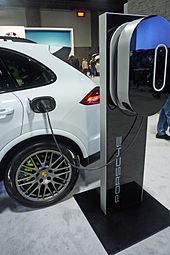

In July 2014, Porsche announced the launch of the Porsche Cayenne S E-Hybrid, a plug-in hybrid with an all-electric range between 18 and 36 km (11 and 22 mi) under the New European Driving Cycle (NEDC) standard. The plug-in model displaced the Cayenne S Hybrid from the line up, and it is part of the revised range. The Cayenne S E-Hybrid is the first plug-in hybrid in the premium SUV segment, allowing Porsche to become the first automaker with three production plug-in hybrid models.[28] Deliveries in Germany were scheduled to begin in October 2014.[29] Sales in the U.S. began in November 2014.[30]
- EPA fuel economy ratings
The following are the official EPA ratings of the Cayenne S E-Hybrid compared with the others models of the 2015 line up available in the U.S.:
| Vehicle | Model year |
Operating mode (AER) |
EPA fuel economy ratings[31] | ||
|---|---|---|---|---|---|
| Combined | City | Highway | |||
| Porsche Cayenne S E-Hybrid | 2015 | Electricity and gasoline (14 mi) |
47 mpg-e (69 kWh/100 mi) |
- | - |
| Gasoline only | 22 mpg | - | - | ||
| Porsche Cayenne Diesel | 2015 | Diesel only | 23 mpg | 20 mpg | 29 mpg |
| Porsche Cayenne S | 2015 | Gasoline only | 20 mpg | 17 mpg | 24 mpg |
| Porsche Cayenne Turbo | 2015 | Gasoline only | 17 mpg | 14 mpg | 21 mpg |
Engines[]
This section does not cite any sources. (December 2016) |
| Model | Production period | Engine | Power (PS, torque) at rpm | Emissions CO 2 |
|---|---|---|---|---|
| Cayenne | 2010-2014 | 3,598 cc (3.6 L; 219.6 cu in) VR6 | 300 PS (221 kW; 296 hp) at 6,300, 400 N⋅m (295 lb⋅ft) at 3,000 | 236 g/km |
| Cayenne | 2014-2018 | 3,598 cc (3.6 L; 219.6 cu in) VR6 | 300 PS (221 kW; 296 hp) at 6,300, 400 N⋅m (295 lb⋅ft) at 3,000 | 215 g/km |
| Cayenne S | 2010-2014 | 4,806 cc (4.8 L; 293.3 cu in) V8 | 400 PS (294 kW; 395 hp) at 6,000, 500 N⋅m (369 lb⋅ft) at 3,500 | 245 g/km |
| Cayenne S | 2015-2018 | 3,604 cc (3.6 L; 219.9 cu in) twin turbo V6 | 420 PS (309 kW; 414 hp) at 6,000, 500 N⋅m (369 lb⋅ft) at 1,350 | 223 g/km |
| Cayenne S Hybrid | 2010-2014 | 2,995 cc (3.0 L; 182.8 cu in) supercharged V6 + electric motor | 380 PS (280 kW; 370 hp) at 5,600, 580 N⋅m (428 lb⋅ft) at 1,000 | 193 g/km |
| Cayenne S E-Hybrid | 2014-2018 | 2,995 cc (3.0 L; 182.8 cu in) supercharged V6 PHEV | 416 PS (306 kW; 410 hp) at 5,500, 590 N⋅m (435 lb⋅ft) at 3,000 | 79 g/km |
| Cayenne GTS | 2010-2014 | 4,806 cc (4.8 L; 293.3 cu in) V8 | 420 PS (309 kW; 414 hp) at 6,500, 515 N⋅m (380 lb⋅ft) at 3,500 | 251 g/km |
| Cayenne GTS | 2015-2018 | 3,604 cc (3.6 L; 219.9 cu in) twin turbo V6 | 440 PS (324 kW; 434 hp) at 6,000, 600 N⋅m (443 lb⋅ft) at 1,600 | 228 g/km |
| Cayenne Turbo | 2010-2014 | 4,806 cc (4.8 L; 293.3 cu in) twin turbo V8 | 500 PS (368 kW; 493 hp) at 6,000, 700 N⋅m (516 lb⋅ft) at 2,250 | 270 g/km |
| Cayenne Turbo | 2014-2018 | 4,806 cc (4.8 L; 293.3 cu in) twin turbo V8 | 520 PS (382 kW; 513 hp) at 6,000, 750 N⋅m (553 lb⋅ft) at 2,250 | 261 g/km |
| Cayenne Turbo S | 2010-2014 | 4,806 cc (4.8 L; 293.3 cu in) twin turbo V8 | 550 PS (405 kW; 542 hp) at 6,000, 750 N⋅m (553 lb⋅ft) at 2,250 | 270 g/km |
| Cayenne Turbo S | 2015-2018 | 4,806 cc (4.8 L; 293.3 cu in) twin turbo V8 | 570 PS (419 kW; 562 hp) at 6,000, 800 N⋅m (590 lb⋅ft) at 2,500 | 267 g/km |
| Cayenne Diesel | 2010-2011 | 2,967 cc (3.0 L; 181.1 cu in) turbo V6 | 240 PS (176 KW; 237 hp) at 4,000, 550 N⋅m (406 lb⋅ft) at 2,000 | |
| Cayenne Diesel | 2011-2014 | 2,967 cc (3.0 L; 181.1 cu in) turbo V6 | 245 PS (180 kW; 242 hp) at 4,000, 550 N⋅m (406 lb⋅ft) at 1,750 | 189 g/km |
| Cayenne Diesel | 2014-2018 | 2,967 cc (3.0 L; 181.1 cu in) turbo V6 | 262 PS (193 kW; 258 hp) at 4,000, 580 N⋅m (428 lb⋅ft) at 1,750 | 173 g/km |
| Cayenne S Diesel | 2014-2018 | 4,134 cc (4.1 L; 252.3 cu in) twin turbo v8 | 385 PS (283 kW; 380 hp) at 3,750, 850 N⋅m (627 lb⋅ft) at 2,000 | 209 g/km |
Guinness World Record[]
On 1 May 2017, a 2017 Porsche Cayenne S Diesel set the Guinness World Record for heaviest aircraft pulled by a production car. The Cayenne towed a 265-ton Air France Airbus A380 to a distance of 42 meters, breaking the previous 2013 record of a Nissan Patrol towing a 170-ton Ilyushin Il-76 to a distance of 50 meters.[32] After the attempt Porsche repeated the test using a petrol-powered Cayenne Turbo S with 800 Nm of torque, 50 Nm less than the S Diesel, in an effort to prove the Cayenne's remarkable ability.[33]
Third generation (2018)[]
| Third generation (9Y0 / 9Y3) | |
|---|---|
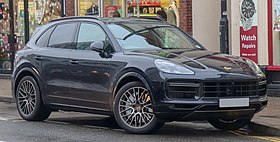 | |
| Overview | |
| Production | 2017–present |
| Model years | 2018–present (Europe) 2019–present (Outside of Europe) |
| Designer | Michael Mauer |
| Body and chassis | |
| Body style | 5-door SUV (9Y0) 5-door coupé SUV (9Y3 Coupe; 2018–present) |
| Platform | Volkswagen Group MLB Evo |
| Related | Volkswagen Touareg Audi Q7 Audi Q8 Bentley Bentayga Lamborghini Urus |
| Powertrain | |
| Engine |
|
| Electric motor | 100 kW (136 PS; 134 hp) integrated Electric motor (e-Hybrid Only) |
| Transmission | 8-speed ZF 8HP series automatic with Tiptronic manual shift mode |
| Battery | 14.1 kWh Lithium ion (2018-2020) 17.9 kWh Lithium ion (2021-present) |
| Dimensions | |
| Wheelbase | 2,895 mm (114.0 in) |
| Length | 4,919 mm (193.7 in) |
| Width | 1,983 mm (78.1 in) |
| Height | 1,636–1,696 mm (64.4–66.8 in) |
The third-generation Porsche Cayenne, which was redesigned from front to back and now bears more of a resemblance to the 911,[34] was revealed online on August 29, 2017 as a 2019 model, based on the Volkswagen Group MLB platform.[35]
A model with a more rakish roofline called the Cayenne Coupé became available in 2019. It was revealed during the 2019 Shanghai Auto Show in April 2019. At launch, there were two models, the Cayenne Coupé and Cayenne Turbo Coupé .
This section needs expansion. You can help by . (June 2018) |
Safety[]
| Test | Points | % |
|---|---|---|
| Overall: | ||
| Adult occupant: | 36.2 | 95% |
| Child occupant: | 39.6 | 80% |
| Pedestrian: | 30.8 | 73% |
| Safety assist: | 7.5 | 62% |
Engines[]
All engines of the third generation models are turbocharged.[35]
| Model | Production period | Engine | Power (PS, torque) at rpm | Emissions CO 2 |
Acceleration 0-62 mph |
|---|---|---|---|---|---|
| Cayenne | 2019- | 2,995 cc (3.0 L; 182.8 cu in) turbo V6 | 340 PS (250 kW; 335 hp) at 5,300-6,400, 450 N⋅m (332 lb⋅ft) at 1,340 - 5,300 | 265 g/km | 6.2 secs |
| Cayenne E-Hybrid | 2019- | 2,995 cc (3.0 L; 182.8 cu in) turbo V6 PHEV | 462 PS (340 kW; 456 hp) at 5,300-6,400, 700 N⋅m (516 lb⋅ft) at 1,340 - 5,300 | 88 g/km | 5.0 secs |
| Cayenne S | 2019- | 2,894 cc (2.9 L; 176.6 cu in) twin turbo V6 | 440 PS (324 kW; 434 hp) at 5,700-6,600, 550 N⋅m (406 lb⋅ft) at 1,800 - 5,500 | 267 g/km | 5.2 secs |
| Cayenne GTS | 2020- | 3,996 cc (4.0 L; 243.9 cu in) twin turbo V8 | 460 PS (338 kW; 454 hp) at 6,000 - 6,500, 620 N⋅m (457 lb⋅ft) at 1,800 - 4,500 | 301 g/km | 4.5 secs |
| Cayenne Turbo | 2019-2021 | 3,996 cc (4.0 L; 243.9 cu in) twin turbo V8 | 550 PS (405 kW; 542 hp) at 5,750 - 6,000, 770 N⋅m (568 lb⋅ft) at 2,000 - 4,500 | 309 g/km | 3.9 secs |
| Cayenne Turbo S E-Hybrid | 2019-2021 | 3,996 cc (4.0 L; 243.9 cu in) twin turbo V8 PHEV | 680 PS (500 kW; 671 hp) at 5,750 - 6,000, 900 N⋅m (664 lb⋅ft) at 2,100 - 4,500 | 110 g/km | 3.8 secs |
| Cayenne Turbo TechArt | 2019-2021 | 3,996 cc (4.0 L; 243.9 cu in) twin turbo V8 | 700 PS (515 kW; 690 hp) at 5,750 - 6,000, 900 N⋅m (664 lb⋅ft) at 2,100 - 4,500 | 350 g/km | 3.2 secs |
| Cayenne Turbo S E-Hybrid (Facelift) | 2021- | 3,996 cc (4.0 L; 243.9 cu in) twin turbo V8 PHEV | 700 PS (515 kW; 690 bhp) at 5,750 - 6,000, 870 N⋅m (642 lb⋅ft) at 1,400 - 5,500 | 111 g/km | 3.5 secs
3.4 secs with Lightweight Package |
| Cayenne Turbo GT | 2022- | 3,996 cc (4.0 L; 243.9 cu in) twin turbo V8 | 640 PS (471 kW; 631 bhp), 850 N⋅m (626 lb⋅ft) | 271 g/km | 3.3 secs |

Rear (Cayenne Turbo)

Cayenne GTS

Rear (Cayenne Coupé)

Cayenne S Coupé
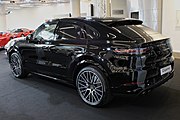
Rear (Cayenne Turbo Coupé)
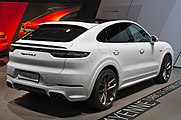
Rear (Cayenne Turbo S E-Hybrid Coupé)

Interior (Cayenne S)
Records[]
In June 2021, a Porsche Cayenne Turbo GT lapped 7:38:928 at Nürburgring Nordschleife. The car was driven by test driver Lars Kern.
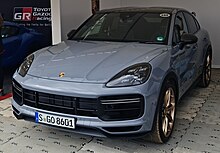
Variants[]
Cayenne Turbo GT[]
On June 30, 2021, Porsche introduced the Cayenne Turbo GT version.It uses 4.0-litre twin-turbo V8 engine and claimed 0-100km/h in 3.3secs/0-60mph in 3.1secs. It equipped with 22-inch wheels with Pirelli P Zero Corsa tyres.[37] Ride height is 18mm lower and total vehicle height is 30mm lower.
See also[]
- List of hybrid vehicles
- Lohner-Porsche Mixte Hybrid, the first hybrid in history.
References[]
- ^ "Porsche presents the new "Made in Slovakia" Cayenne". spectator.sme.sk. 31 August 2017. Retrieved 14 January 2018.
- ^ "Facelifted Porsche Cayenne revealed ahead of Paris motor show launch". Autocar. 23 July 2014. Retrieved 28 July 2014.
- ^ "2004 Porsche Cayenne Review". JB car pages. Retrieved 2011-04-03.
- ^ Jump up to: a b "2004 Porsche Cayenne Specs". JB car pages. Retrieved 2011-04-03.
- ^ "Porsche Cayenne GTS at the Chicago Auto Show". Automoblog.net. 2008-02-15. Archived from the original on 2008-08-28. Retrieved 2010-10-03.
- ^ "2008 Porsche Cayenne Specs". JB car pages. Retrieved 2011-04-03.
- ^ Tan, Paul. "Porsche Cayenne TDI diesel in February 2009". Paultan.org. Retrieved 2010-10-03.
- ^ Abuelsamid, Sam (2009-02-19). "Geneva Preview: Porsche to publicly debut Cayenne diesel". Autobloggreen.com. Retrieved 2010-10-03.
- ^ Nunez, Alex (2007-04-15). "Porsche Cayenne S Transsyberia: factory-built rally machine". Autoblog.com. Retrieved 2010-10-03.
- ^ Neff, John (2008-09-08). "Paris Preview: Porsche Cayenne S Transsyberia special edition". Autoblog.com. Retrieved 2010-10-03.
- ^ "New Porsche Cayenne GTS Porsche Design Edition 3". Porsche.com. 2009-03-25. Retrieved 2010-10-03.
- ^ Neff, John (2009-03-25). "Limited-edition Cayenne GTS Porsche Design Edition 3 to hit the streets". Autoblog.com. Retrieved 2010-10-03.
- ^ "ZF Technology Helps "Company Cars of the Year 2013" Gain a Podium Place". Retrieved 17 November 2013.
- ^ "Porsche Goes Green". Archived from the original on 23 March 2009. Retrieved 18 May 2010.
- ^ "2008 Porsche Cayenne Review". JB car pages. Retrieved 2011-04-03.
- ^ Jump up to: a b c "2011 Porsche Cayenne Specs & Features". JB car pages. Retrieved 2011-04-03.
- ^ "2011 Porsche Cayenne Review". JB car pages. Retrieved 2011-04-03.
- ^ Cayenne S or Turbo? - Page 2 - MBWorld.org Forums says (2009-03-16). "2010 Porsche Cayenne SUV - SPY SHOTS". StreetCars. Retrieved 2009-07-09.[permanent dead link]
- ^ "2011 Porsche Cayenne Hybrid Specs & Features". JB car pages. Retrieved 2011-04-03.
- ^ "Porsche Dynamic Chassis Control (PDCC) - Chassis - Cayenne Turbo - Dr. Ing. h.c. F. Porsche AG". Porsche AG - Dr. Ing. h.c. F. Porsche AG.
- ^ "Cayenne S Diesel: a measure of efficiency".
- ^ "2013 Porsche Cayenne Turbo S model confirmed". autoweek.com. 10 October 2012.
- ^ "PORSCHE CAYENNE HYBRID OFFICIEEL AANGEKONDIGD". Autowereld. 19 September 2005. Retrieved 9 January 2020.
- ^ "PORSCHE CAYENNE HYBRID IN PROTOTYPE-FASE". Autowereld. 31 July 2007. Retrieved 9 January 2020.
- ^ "Look: Porsche Cayenne Hybrid". Edmunds. 2007-08-06. Archived from the original on 2008-09-22. Retrieved 2010-10-03.
- ^ "Porsche Cayenne S Hybrid". Auto Express. 3 April 2010. Retrieved 28 July 2014.
- ^ "2011 Porsche Cayenne S Hybrid on Sale in November". Insideline.com. 2010-10-28. Retrieved 2011-04-24.
- ^ Porsche Press Release (2014-07-24). "Porsche introducing new plug-in Cayenne S E-Hybrid SUV; third plug-in from Porsche". Green Car Congress. Retrieved 2014-07-27.
- ^ Martin Achter (2014-07-24). "Neuer Porsche Cayenne kommt im Oktober" [New Porsche Cayenne comes in October]. KFZ-Betrieb (in German). Retrieved 2014-07-27.
- ^ Jay Cole (2014-12-03). "November 2014 Plug-In Electric Vehicle Sales Report Card". InsideEVs.com. Retrieved 2014-12-04.
- ^ U. S. Environmental Protection Agency and U.S. Department of Energy (2014-12-05). "Compare Side-by-Side - 2015 Porsche Cayenne S E-Hybrid, 2015 Porsche Cayenne Diesel, 2015 Porsche Cayenne S and 2015 Porsche Cayenne Turbo". Fueleconomy.gov. Retrieved 2014-12-05.
- ^ Tadeo, Patrick Everett (2 May 2017). "Porsche Cayenne tows Airbus A380 to set Guinness World Record". Carmudi/Yahoo! News. Retrieved 3 May 2017.
- ^ "Watch a Porsche Cayenne tow an Airbus A380, earn a world record - Roadshow". Roadshow. Retrieved 2017-05-08.
- ^ "Porsche Cayenne Prices, Reviews, and Pictures | Edmunds". Edmunds.com. March 21, 2019.
- ^ Jump up to: a b Porsche (2017-08-29). "World premiere of the new Cayenne in Zuffenhausen". Porsche. Retrieved 2017-08-30.
- ^ "Euro NCAP – Porsche Cayenne 3.0 diesel, LHD (2017)". euroncap.com. Retrieved 12 August 2018. Report
- ^ Droppa, Denis (30 June 2021). "Cayenne Turbo GT is Porsche's new top gun". businesslive.
Bibliography[]
- Becker, Clauspeter; Warter, Stefan (2002). Porsche Cayenne. Bielefeld: Delius Klasing Verlag. ISBN 3-7688-1403-3. (in English)
- Morris, Raymond. "2014 Porsche Cayenne Platinum Edition Review". izmoStudio. Archived from the original on 9 November 2014. Retrieved 24 August 2014.
External links[]
| Wikimedia Commons has media related to Porsche Cayenne. |
| show |
|---|
- Porsche vehicles
- Cars introduced in 2002
- 2010s cars
- 2020s cars
- Mid-size sport utility vehicles
- Luxury crossover sport utility vehicles
- All-wheel-drive vehicles
- Cars powered by VR engines
- Hybrid sport utility vehicles
- Plug-in hybrid vehicles
- Partial zero-emissions vehicles
- Vehicles with four-wheel steering






